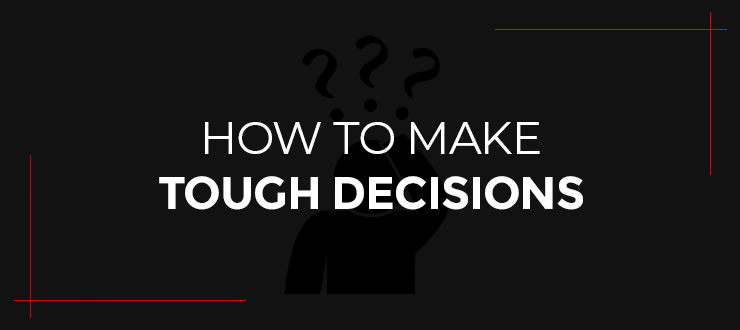We've all been there. A tough situation where we have to make up our minds and decide between doing what's right and doing what's easy.
So the question is, how do we make a decision that we're not going to regret? How do we ensure that we don't succumb to our fears, emotions and weaknesses and make the easy decision instead of doing what we know is right?

The March and the Meeting
J was one of the best of us. He was mentally tough, emotionally mature and a great person to be around. He was also limping and later found out that he had grade 3 shin splints. He was basically walking around on cracked bones.
In a couple days time we're scheduled to complete one of the most grueling exercises in the whole training period. A 120 km march to get your unit's beret. A status symbol that signals that you've graduated advanced bootcamp and are now a part of the unit.
On the days leading to the march there was a discussion about whether J should even complete the march or sit it out and heal. Most of us felt that there was no benefit for him to make the march and that he should sit it out, heal and get ready for the next phases.
Our officer, however, thought differently. He made a decision and gave his orders, regardless of how we felt and what we thought. J would complete the march.
After completion of the march we had our customary Friday team meeting. It's a space where we, the soldiers, can openly say what's on our minds to the officers and to each other.
This Friday's meeting was a space for us to recap what the march was like and how our first week in the unit's base had gone. J's situation was on everyone's minds as he was walking in obvious agony and it was obvious that he would need to sit out entirely for a couple weeks to heal.
Our officer addressed it head on. The conversation went like this.
Officer to J: "I know you're hurt, but are you happy you did the march, got your beret and can say that you did that?"
J: "Yeah, I'm happy I did it."
Officer: "That's exactly the point. Your mental resiliency is still in it's infancy. You're making decisions based on how you'll feel in the short term. I'm trying to teach you how to make decisions that you'll be proud of in hindsight."

The Hindsight Matrix
Honestly, at the time, I didn't get it. That officer was someone we didn't like and since it came from his mouth we gave it less merit... But he was absolutely right.
There's no simpler way to make good decisions then to ask yourself the following question when you hit that fork in the road "What decision will I be proud of in hindsight?" "When I look back at this in a day, a month, a year, a decade, when the momentary discomfort has subsided ... What decision will I be proud of in hindsight?"

That's the lesson. We usually avoid making hard decisions because of the momentary discomfort we will likely face. We secede to the discomfort and make decisions that don't serve us in the long run. Decisions that we end up regretting when we look back.
Ask yourself, in which situation in your life have you missed out on something great just because you chose what was easier instead of what was right.
There's a saying, "Easy choices, hard life. Hard choices, easy life." Here's a checklist to make sure you make the correct and hard decisions that will lead to an easy life.
The Hindsight Matrix Checklist
1. What's more important for me, short term comfort or long term growth?
2. Which decision will lead to long term growth?
3. Will I be proud of this decision in hindsight?
Recap
The next time you face a dilemma, a situation where you're not sure if you should choose Option A or Option B remind yourself that "Pain and discomfort are temporary, but pride is forever" and ask yourself "Will I be proud of this decision in hindsight?"
Do that and you'll arrive at a decision that will serve you in the long run and that you will proud of in hindsight. Now you just have to decide and execute.
It's simple not easy.
Itamar
P.S. Join our newsletter to cultivate an elite mindset that will enable you to:
- Make better business decisions that aren't tied to your personal issues
- Control your stress response and make effective pragmatic decisions
- Aim higher in life and business... and then aggressively pursue it

